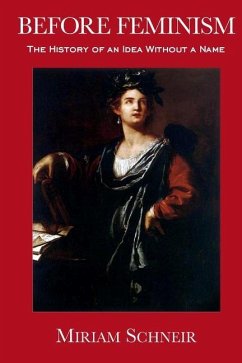"Schneir brings to vivid life women who were visible and active long before there existed a word--'feminist'--to describe them." --Robin Morgan, editor, Sisterhood Is Powerful; Ms. Magazine, editor-in-chief The editor of the classic anthologies Feminism: The Essential Historical Writings and Feminism in Our Time now takes us further back in time to uncover the hidden roots of one of the most transformative movements of the twentieth century. Miriam Schneir's exploration of the history of feminism before 1848 tells the little-known story of the rise of feminist sentiment through two millennia, from ancient Greece to Seneca Falls. It asks: How did the founders of the world's first sustained movement for women's rights come to believe that "woman is man's equal"? What gave them the self-assurance to repudiate the widely held assumption--one supported by biblical command and enforced by legal statute throughout the Western world--that the female of the species is innately inferior to the male? Before Feminism: The History of an Idea Without a Name shows that women themselves never entirely accepted demeaning stereotypes of their own mothers, daughters, sisters, and themselves. It provides evidence that pride in womanhood was maintained and reinforced across the generations by a separate women's culture that was transmitted from woman to woman within female spaces to which men had little access: birthing rooms and rooms where the dead were prepared for burial; cattle milking pens and riverside laundries; convents and heretical sects; medieval textile workshops and female factory-workers' organizations; women's literary societies and girls' schools; and many other primarily female realms. Within such spaces, women also learned to conform when necessary to the rules of patriarchal society, since failure to do so could result in ridicule, physical punishment, ostracism, or even death. Long before the word "feminism" existed, women struggled to overcome gender restrictions and to realize their dreams.
Hinweis: Dieser Artikel kann nur an eine deutsche Lieferadresse ausgeliefert werden.
Hinweis: Dieser Artikel kann nur an eine deutsche Lieferadresse ausgeliefert werden.








